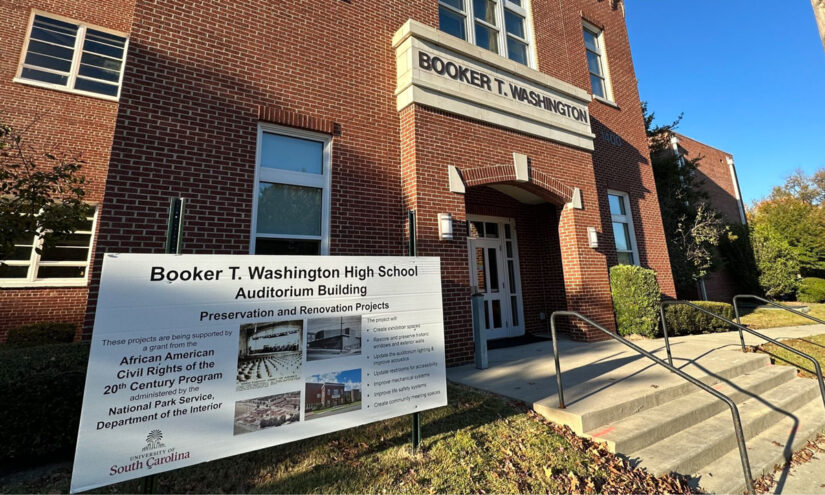During this summer, a team of students from MIT embarked on a journey to the sou …
USC to Expand Civil Rights Research Hub on Site of Former Historic Black School
Carlos Changemaker

COLUMBIA — After securing full funding for the restoration of Columbia’s first Black public high school, the director of the University of South Carolina’s civil rights center is now focused on expansion.
The project, estimated to cost $24 million, will involve constructing a new building on the historic property of Booker T. Washington High School. Bobby Donaldson, director of the University of South Carolina Center for Civil Rights History and Research, wants to showcase the stories and contributions of South Carolinians in the national Civil Rights Movement in a modern second building.
The auditorium of the former high school has been under renovation for the past decade and is the only structure that remains standing on the campus. The final phase of improvements, which will be funded by a $5 million federal grant awarded in June, is scheduled to begin in late 2024 or early 2025. This will bring the total spent on preserving the auditorium to $8.7 million.
However, the high school building constructed in 1956 has its limitations.
“The new space is where we can envision how we reach audiences decades beyond our time,” Donaldson explained.
The current space has informational placards about the history of the school, the students, and the educators. However, it lacks the capacity to permanently house exhibits and the school’s collection of audio recordings, film clips, photographs, postcards, diaries, and manuscripts. There have only been temporary displays.
Funding for the expansion
The new facility will be adjacent to the existing one and will serve as a research library, archives, conference space, offices, and modern exhibit space. It will also include more immersive, interactive, and high-tech displays to bring history to life. So far, Donaldson has raised $9 million for the expansion from federal grants, private donations, the university, and recently, a $1 million allocation in the state budget sponsored by state House Minority Leader Todd Rutherford, D-Columbia.
Donaldson hopes that the state funding will encourage more private sources to contribute to the project.
“I want to give people a reason to come to Columbia,” Rutherford said. “I think if Columbia is going to be on the map, we have to take advantage of our assets. The (Congaree) River is one of those, and our history is another.”
The new building of the center aims to pay homage to the original 4-acre high school campus, which played a significant role in Columbia’s Black community from 1916 until its closure in 1974.
‘More than a school’
Booker T. Washington High School was the largest Black public high school in South Carolina and the only place where Black children could receive a high school education in Columbia during an era of segregation. It shaped generations of educators, trades workers, and community and Civil Rights leaders.
Doris Glymph Greene, the school’s 1959 valedictorian, described the building as more than just a school. “It’s a shrine to the struggles and triumphs of African Americans in Columbia,” she said.
After the school’s closure and sale to the University of South Carolina in 1974, only one building remained standing, serving as a testament to the fight for equality.
The building was constructed using funds from South Carolina’s inaugural 3% sales tax, which was pushed by then-Gov. James Byrnes as a way to resist desegregation. Many separate Black and white schools were built in an unsuccessful attempt to demonstrate that public schools could be “separate but equal.”
The expansion of the center follows the opening of the International African American Museum in Charleston, which focuses on African culture, the transatlantic slave trade, and the achievements of Black South Carolinians.
Donaldson emphasized that the University of South Carolina’s civil rights center focuses on archiving, researching, and providing educational resources rather than tourism. He aims to remind audiences that South Carolina played a vital role in the struggle for civil rights.
South Carolina’s history includes significant events such as the U.S. Supreme Court’s Edwards v. South Carolina decision in 1963 and the protest against segregation on Columbia’s city buses by Sarah Mae Fleming before Rosa Parks’ famous bus protest in Montgomery, Alabama.
With the expansion of the Center for Civil Rights History and Research, Rutherford believes there will be opportunities to educate the public about the Civil Rights Movement right here in South Carolina.


